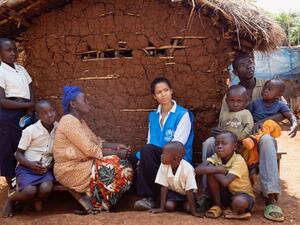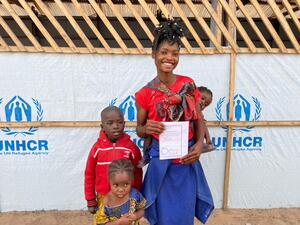DRC: Rwandan returnees
DRC: Rwandan returnees
Since the beginning of the year, UNHCR has noted a marked upward trend in the weekly number of Rwandan refugees in the eastern Democratic Republic of Congo, DRC, wanting to return to Rwanda. More than 230 Rwandan refugees in the eastern Democratic Republic of Congo volunteered for repatriation last week, bringing to 3,700 the total number of Rwandans who returned home since the start of 2005. In April, some 1,300 Rwandans repatriated. The repatriation operation started in 2000 but the number of refugees wanting to return has been low with only 8,000 returning last year.
The recent increase in returns coincides with an announcement on 31 March by the FDLR, a Rwandan rebel militia group that it would disarm and peacefully return to Rwanda. The return numbers change weekly, seemingly related to whether or not Rwandan civilians are allowed to leave FDLR-controlled areas.
Tens of thousands of Rwandan refugees have been living scattered over isolated areas in the Kivus since 1996. Their life in the forests is extremely hard, and most of them come out in very bad health, especially the children.
In light of the sharp increase of Rwandan refugees wanting to return home, we are currently expanding the capacity of our repatriation system and will shortly open several new assembly points in North and South Kivu provinces. The assembly points have been set up on the edge of the forest where refugees who want to return home can gather. UNHCR then takes them to the town of Bukavu and from there to Rwanda.
UNHCR is working in close cooperation with MONUC, the UN's peacekeeping mission in the Democratic Republic of Congo. The refugee agency only assists civilians to return home, while MONUC is responsible for the return of FDLR fighters and their dependents. Rwandan combatants approaching any of UNHCR's 17 assembly points are referred to MONUC.
UNHCR has repatriated more than 77,000 refugees to Rwanda since the start of the operation in 2000. If the FDLR militia fulfills its pledge of disarmament and return, the number of returns is expected to increase dramatically in the next few months. We are estimate there are currently 40,000 Rwandan refugees in eastern DRC.









